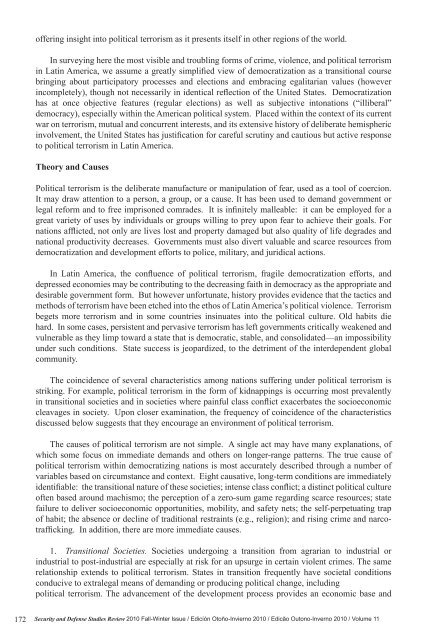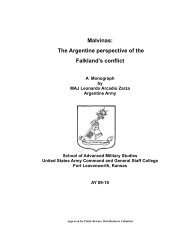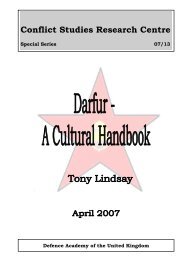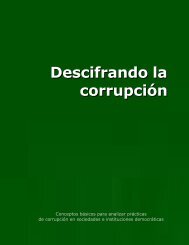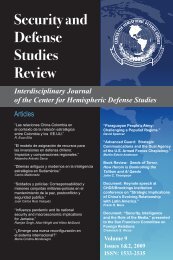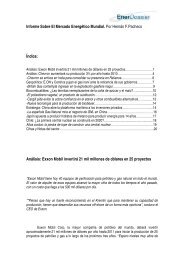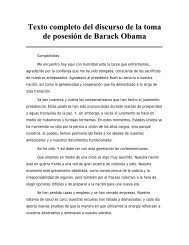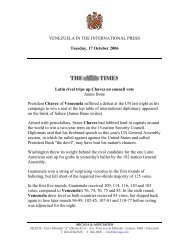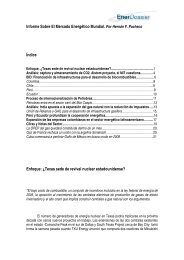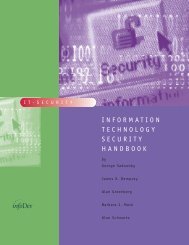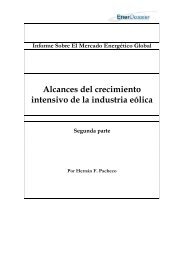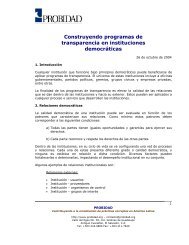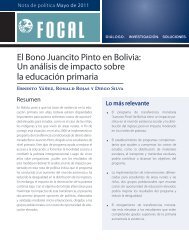offering insight into political terrorism as it presents itself in other regions of the world.In surveying here the most visible <strong>and</strong> troubling forms of crime, violence, <strong>and</strong> political terrorismin Latin America, we assume a greatly simplified view of democratization as a transitional coursebringing about participatory processes <strong>and</strong> elections <strong>and</strong> embracing egalitarian values (howeverincompletely), though not necessarily in identical reflection of the United States. Democratizationhas at once objective features (regular elections) as well as subjective intonations (“illiberal”democracy), especially within the American political system. Placed within the context of its currentwar on terrorism, mutual <strong>and</strong> concurrent interests, <strong>and</strong> its extensive history of deliberate hemisphericinvolvement, the United States has justification for careful scrutiny <strong>and</strong> cautious but active responseto political terrorism in Latin America.Theory <strong>and</strong> CausesPolitical terrorism is the deliberate manufacture or manipulation of fear, used as a tool of coercion.It may draw attention to a person, a group, or a cause. It has been used to dem<strong>and</strong> government orlegal reform <strong>and</strong> to free imprisoned comrades. It is infinitely malleable: it can be employed for agreat variety of uses by individuals or groups willing to prey upon fear to achieve their goals. Fornations afflicted, not only are lives lost <strong>and</strong> property damaged but also quality of life degrades <strong>and</strong>national productivity decreases. Governments must also divert valuable <strong>and</strong> scarce resources fromdemocratization <strong>and</strong> development efforts to police, military, <strong>and</strong> juridical actions.In Latin America, the confluence of political terrorism, fragile democratization efforts, <strong>and</strong>depressed economies may be contributing to the decreasing faith in democracy as the appropriate <strong>and</strong>desirable government form. But however unfortunate, history provides evidence that the tactics <strong>and</strong>methods of terrorism have been etched into the ethos of Latin America’s political violence. Terrorismbegets more terrorism <strong>and</strong> in some countries insinuates into the political culture. Old habits diehard. In some cases, persistent <strong>and</strong> pervasive terrorism has left governments critically weakened <strong>and</strong>vulnerable as they limp toward a state that is democratic, stable, <strong>and</strong> consolidated—an impossibilityunder such conditions. State success is jeopardized, to the detriment of the interdependent globalcommunity.The coincidence of several characteristics among nations suffering under political terrorism isstriking. For example, political terrorism in the form of kidnappings is occurring most prevalentlyin transitional societies <strong>and</strong> in societies where painful class conflict exacerbates the socioeconomiccleavages in society. Upon closer examination, the frequency of coincidence of the characteristicsdiscussed below suggests that they encourage an environment of political terrorism.The causes of political terrorism are not simple. A single act may have many explanations, ofwhich some focus on immediate dem<strong>and</strong>s <strong>and</strong> others on longer-range patterns. The true cause ofpolitical terrorism within democratizing nations is most accurately described through a number ofvariables based on circumstance <strong>and</strong> context. Eight causative, long-term conditions are immediatelyidentifiable: the transitional nature of these societies; intense class conflict; a distinct political cultureoften based around machismo; the perception of a zero-sum game regarding scarce resources; statefailure to deliver socioeconomic opportunities, mobility, <strong>and</strong> safety nets; the self-perpetuating trapof habit; the absence or decline of traditional restraints (e.g., religion); <strong>and</strong> rising crime <strong>and</strong> narcotrafficking.In addition, there are more immediate causes.1. Transitional Societies. Societies undergoing a transition from agrarian to industrial orindustrial to post-industrial are especially at risk for an upsurge in certain violent crimes. The samerelationship extends to political terrorism. States in transition frequently have societal conditionsconducive to extralegal means of dem<strong>and</strong>ing or producing political change, includingpolitical terrorism. The advancement of the development process provides an economic base <strong>and</strong>172<strong>Security</strong> <strong>and</strong> <strong>Defense</strong> <strong>Studies</strong> <strong>Review</strong> <strong>2010</strong> <strong>Fall</strong>-Winter Issue / Edicíón Otoño-Invierno <strong>2010</strong> / Edicão Outono-Inverno <strong>2010</strong> / Volume 11
infrastructure conditions that may also foment crime when coupled with ineffective <strong>and</strong> corruptpolicy, government, or military forces.Transitions in societies are times of political <strong>and</strong>/or social upheaval. Instability unsettles society’sstructures even if the transition itself is not characterized by violence. New cleavages may appear,accompanied by increased lawlessness or corruption. Significant segments of society may haveincomes insufficient to support themselves through legitimate means as their nation shifts from oneeconomic base to another. State-funded social safety nets are minimal or absent under a traditionaldevelopment rubric of austerity. Urbanization increases, yet jobs are scarce <strong>and</strong> cities lack adequateexisting infrastructure to support the population shift. People are lost in societal cracks <strong>and</strong> leftdisenfranchised <strong>and</strong> desperate as old ways of life fade without any clear alternatives provided by thestate or the market. Desperation may encourage political terrorism where there is little confidencein the intended result of successful transition <strong>and</strong> where there are only feeble mechanisms to checkviolence.2. Class Conflict. Class conflict is another explanatory element of political terrorism. Whilemany Latin American countries have experienced increased income over the last decade, incomeinequality remains higher here than in any other region of the world. Economic crisis makes it worse.Few control the preponderance of power <strong>and</strong> resources within many of these societies. In most cases,paper currency translates to political currency, allowing the wealthy to be politically influential <strong>and</strong>marginalizing the overwhelming majority who are poor, working class, or lower class. Thus, masseswho often subsist on less than a living wage <strong>and</strong> who lack basic necessities are left with a sense ofimpotence in a political system that denies them voice, representation, or equal control.Political terrorism confronts these class iniquities, perceived or real. Through their acts,terrorists may seek to galvanize political support behind legal reforms, elections, parties, or evenrevolutionary measures that in some manner address the income <strong>and</strong> power disparities of society.Political terrorists in societies with class conflict may be seeking a redistribution of wealth <strong>and</strong> areallocation of power, however crude their methods or poorly articulated their logic. Terrorist <strong>and</strong>criminal gangs often increase their popularity by building schools, hospitals, <strong>and</strong> athletic fields whichcash-strapped governments cannot afford.3. Political Culture <strong>and</strong> Machismo. Latin American political culture is often characterized ashaving strong elements of machismo, even today. In an environment traditionally dominated bymen <strong>and</strong> where respect is earned through conspicuous bravery, expressions of heroic conquest,<strong>and</strong> decisive action, the methods of political terrorism may resonate with those frustrated by theirineffectiveness within state-sanctioned participatory political processes. This is especially true todayof Central American young people: no jobs, no education, no prospects, hence the turn to crime. Thebigger the guns, the more respect one comm<strong>and</strong>s.Political culture also represents the political norms, underst<strong>and</strong>ings, <strong>and</strong> mores of society. InLatin America, what may have started as an accident of history—the orchestrated use of violenceto achieve either limited or total gain—now has had a certain legitimacy conferred upon it bysuccess, repetition, <strong>and</strong> societal acceptance. Violence becomes part of the political process. Politicalterrorism in every corner of the world has been justified as the fight for freedom. Nowhere hasthat iconography been more celebrated than in the countries of such people as Simon Bolívar, CheGuevara, Fidel Castro, <strong>and</strong> Hugo Chávez.4. Scarce Resources <strong>and</strong> Overcoming the Zero-Sum Game. The scarcity of resources confrontingsome countries of the Caribbean <strong>and</strong> Central <strong>and</strong> South America has rendered developmentconsiderably more problematic. A country with negligible natural endowments or comparativeadvantage in cash crops alone has no obvious economic base that can be cultivated <strong>and</strong> reaped fordevelopment income. Industrialization becomes nearly impossible because raw materials, finished<strong>Security</strong> <strong>and</strong> <strong>Defense</strong> <strong>Studies</strong> <strong>Review</strong> <strong>2010</strong> <strong>Fall</strong>-Winter Issue / Edicíón Otoño-Invierno <strong>2010</strong> / Edicão Outono-Inverno <strong>2010</strong> / Volume 11 173
- Page 2 and 3:
Security and Defense Studies Review
- Page 4 and 5:
CommentariesSecurity Cooperation Be
- Page 6:
6Security and Defense Studies Revie
- Page 9 and 10:
El espacio de las mujeres en las Fu
- Page 11 and 12:
La organización e institucionaliza
- Page 14 and 15:
encuentra altamente asociada al cam
- Page 16 and 17:
ministerial para la equidad de gén
- Page 19 and 20:
BibliografíaBarrancos, Dora (2007)
- Page 21 and 22:
Anexo IPaísIncorporación Femenina
- Page 23:
Anexo IIMujeres militares sudameric
- Page 26:
Todo un conjunto de cualidades, cap
- Page 29:
500 y durante la Batalla de Sarand
- Page 32 and 33:
miembros de la soberanía de la Nac
- Page 34 and 35:
10 de octubre de ese año, la Compa
- Page 36 and 37:
algunos barcos de apoyo para alberg
- Page 38 and 39:
1.75 metros de altura y como requis
- Page 40 and 41:
de producción sustituyendo al homb
- Page 42 and 43:
y sicológica, no sólo en los ámb
- Page 44 and 45:
La segunda etapa se caracterizó po
- Page 46 and 47:
Sin embargo, las preguntas acerca d
- Page 48 and 49:
La normativa vinculada con la asign
- Page 50 and 51:
conductas que pudieran encuadrarse
- Page 52 and 53:
Género en el marco de las Operacio
- Page 54 and 55:
ecordar que las ciencias sociales y
- Page 56 and 57:
56Security and Defense Studies Revi
- Page 58 and 59:
De ese modo nos encontramos con mod
- Page 60 and 61:
escala descendente de la oficialida
- Page 62 and 63:
del total. Debe destacarse que dent
- Page 64 and 65:
BibliografíaCarreiras, H.: Gender
- Page 66 and 67:
Tras la aprobación de esta histór
- Page 68 and 69:
Una vez aprobada la Resolución 132
- Page 70 and 71:
para designar asesores de género e
- Page 73 and 74:
firme se ha materializado en la ado
- Page 76 and 77:
la construcción de la paz, la reco
- Page 78 and 79:
Sin embargo, a medida que avanzaba
- Page 81 and 82:
Women on the Front Lines of the Fig
- Page 83 and 84:
term even has meaning any longer wi
- Page 85 and 86:
following graduation. 15 Of course,
- Page 87 and 88:
including members from other Americ
- Page 89 and 90:
Solidariedade ou interesse? O que l
- Page 91 and 92:
em mais amplo e complexo. 7A possib
- Page 93 and 94:
Participação dos Estados-Membros
- Page 95:
sujeitos a alguma OMP. Aqueles que,
- Page 98 and 99:
às recomendações das Fases II, I
- Page 100 and 101:
Franco, que assumira após o Impeac
- Page 102 and 103:
O Brasil, por intermédio do Presid
- Page 104 and 105:
No entanto, no tocante especificame
- Page 106 and 107:
Portanto, não se consegue visualiz
- Page 108 and 109:
ReferênciasAlmeida Pinto, J.R. de;
- Page 110 and 111:
______. United Nations Department o
- Page 112 and 113:
Beyond economic activities, the PRC
- Page 114 and 115:
soy oil into the country, a flow wh
- Page 116 and 117:
As is the case with Chinese investm
- Page 118 and 119:
In some cases, Chinese companies, l
- Page 120 and 121:
Although it is not possible to pred
- Page 122 and 123: Considering this, we will now go fr
- Page 124 and 125: The contribution of Chilean troops
- Page 126 and 127: within and outside the nation?3. Ho
- Page 128 and 129: 128Security and Defense Studies Rev
- Page 130 and 131: 130Security and Defense Studies Rev
- Page 132 and 133: the Iran-Contra affair, one of the
- Page 134 and 135: all American hostages were released
- Page 136 and 137: “As he frequently said with pride
- Page 138 and 139: making operation 48 was conducted s
- Page 140 and 141: secret army alongside skilled profi
- Page 142 and 143: public than Kelly, taking issue wit
- Page 144 and 145: Some conservatives, even within the
- Page 146 and 147: opponents that he was “getting pr
- Page 148 and 149: for Defense (SUBDEF)—could initia
- Page 150 and 151: Hence, our countries are showing a
- Page 152 and 153: I am referring to Ibero-American Su
- Page 154 and 155: Thus, our country has agreed to the
- Page 156 and 157: sustraer mi producción intelectual
- Page 158 and 159: hombres (22,288).• Inclusión. Al
- Page 160 and 161: La perspectiva de trabajar en el di
- Page 162 and 163: 162Security and Defense Studies Rev
- Page 164 and 165: assignment on the U.S. Secretary of
- Page 166 and 167: las Operaciones de Paz se abren a u
- Page 168 and 169: ConclusiónA modo de conclusión, u
- Page 170 and 171: 170Security and Defense Studies Rev
- Page 174 and 175: goods, and skilled labor must all b
- Page 176 and 177: country” like North Korea. To be
- Page 178 and 179: 178Security and Defense Studies Rev
- Page 180 and 181: views of women, in effect disabling
- Page 182 and 183: Marine Col. William T. Hewes’ arg
- Page 184 and 185: 19. Hughes, Melanie M. (2007) “Un
- Page 186 and 187: MacEoin. Commonweal 14: 8-11.This i
- Page 188 and 189: 37. Sans Echaìniz, María. (1992)
- Page 190 and 191: 47. Woodward, Rachel, and Patricia
- Page 192 and 193: elucidativos das dificuldades que e
- Page 194 and 195: 194Security and Defense Studies Rev
- Page 196 and 197: of an integrated Canadian company i
- Page 198 and 199: 198Security and Defense Studies Rev
- Page 200 and 201: stated it would rightfully infringe
- Page 202 and 203: First, through an examination of de
- Page 204 and 205: 204Security and Defense Studies Rev
- Page 206 and 207: impact on the reader, by acknowledg
- Page 208 and 209: To the Editor:Kevin P. Newmeyer’s
- Page 210 and 211: Whitney Hoft was a Center for Hemis
- Page 212 and 213: The transformation of the role of w
- Page 214 and 215: en Puerto Rico, esta soldada resume
- Page 216 and 217: Deconstruyendo a Ollie: Cómo los c
- Page 218: Center for Hemispheric Defense Stud


